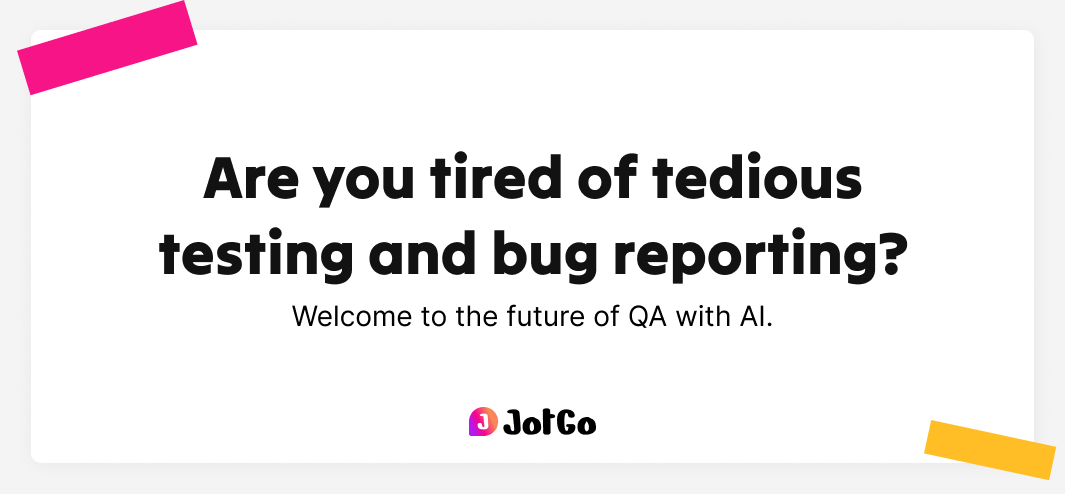The Future of QA: How AI Is Transforming Bug Reporting and Testing

Software development is moving faster than ever and QA is no exception. Traditional methods of bug reporting and testing involve repetitive tasks, long resolution times and human error. But that’s changing. Artificial Intelligence (AI) is stepping in to change how QA teams work, automating, accuracy and speed up workflows.
This blog explores how AI is changing QA. We’ll look at its role in automating repetitive tasks like bug triaging, improving reporting and reducing resolution times. Finally we’ll highlight how JotGo is leading the way with AI driven insights to make software testing faster, more efficient and more reliable.
AI in QA Is Automating Repetitive Tasks
The Problem with Repetitive QA Work
QA engineers spend a lot of time on repetitive tasks like bug triaging and regression testing. Manually sorting through bug reports to prioritise issues can be time consuming and prone to mistakes. Repetitive testing can distract engineers from more strategic activities like improving test coverage or analysing system behavior.
AI Automation in Action
AI is changing the game by doing these repetitive tasks. Through machine learning algorithms QA tools can now automatically classify and prioritise bug reports based on severity, frequency and impact. Advanced AI models can even detect duplicate reports and consolidate issues to streamline workflows.
For example tools like Jira have AI driven features to assist in bug classification and prioritisation. This allows QA teams to focus on fixing critical issues instead of spending hours going through tickets.
Chatbots and virtual assistants also play a role by helping QA teams quickly get information or suggestions to fix a specific bug. AI doesn’t just speed up the process it reduces the chances of human error so the most important issues get attention first.
How AI Is Improving Bug Reporting
The Challenge of Accurate Reporting
Accurate bug reports are key but they’re not always easy to produce. Developers often get reports with not enough detail to reproduce the issue, requiring more back and forth communication that slows down the resolution process.
AI’s Role in ReportingAI driven tools simplify bug reporting by collecting key data automatically. These tools can capture browser history, system configurations and logs when a bug occurs. This data is then packaged into a report and reduces the need for manual input and guessing.
An AI assisted bug reporting tool like JotGo integrates into your workflow. Imagine notifying your QA team of a bug with one click and the system gathering all the information the engineers need to take action. No more endless emails or redundant Slack threads—all the info developers need is right there.
AI can also analyze patterns in bug reports to identify recurring issues or predict future issues so teams can take proactive measures to prevent similar bugs from surfacing.
Faster Bug Resolution with AI
Faster Fixes, Higher Efficiency
AI doesn’t stop at reporting—it makes the resolution process faster too. Using historical data and learned patterns AI tools suggest fixes for recurring issues so developers can fix faster.
For example AI powered debugging tools can analyze code and pinpoint the root cause of errors. Some tools go even further and automatically generate patches to fix the bugs. This reduces the feedback loop so releases can move forward without delay.
Real-Time Feedback
Real-time feedback loops are another big benefit of AI in QA. Testing tools now integrate live AI monitoring to flag issues during the testing phase itself. Developers get instant alerts about potential issues so they can address errors before they snowball into bigger issues that affect the user experience.
JotGo’s Vision for AI in QA
At JotGo we believe QA processes shouldn’t feel like a bottleneck in your software development lifecycle. That’s why we’re using AI to simplify and improve bug reporting and testing at every stage of product development. Here’s how our AI driven insights are helping QA teams:
1. Simplified Bug Reporting
Our reporting tool automatically collects key data points - system logs, error messages, user actions - saving time and so nothing is left out. No more endless descriptions JotGo does the heavy lifting for you.
2. Smarter Bug Triaging
JotGo uses AI to classify and prioritise bugs based on severity and urgency. Duplicate bugs? No problem - our system identifies them and reduces clutter in your backlog.
3. Machine Learning Insights
Our platform looks at historical bug reports to predict recurring issues and suggest fixes. Result? Fewer surprises, more productivity.
4. Seamless Integration
JotGo integrates with tools you already use like Jira, Trello and Slack for a unified experience for your entire team. Faster communication, less pain.
Why AI in QA is Future-Proofing Software Development
Adding AI to QA processes isn’t a trend - it’s the future. By automating repetitive tasks AI reduces human error and frees up QA teams to do value added work. It improves bug reporting accuracy and speeds up resolutions so companies can deliver software faster than ever.
But the magic of AI lies in its ability to learn and adapt. With each bug it analyses AI gets smarter, refines its processes and contributes to better outcomes over time. For QA teams this means long term efficiency gains and a competitive advantage in the tech world.
Try AI-Driven QA Today
The future of QA is now and AI is at the heart of it. If you want to get rid of the tedious parts of testing and bug reporting it’s time to see how JotGo’s AI driven insights can help your team.
Start your free trial today and try the future of QA with JotGo.











